Wesleyan University's Ezra and Cecile Zilkha Gallery presents "Flames of My Homeland: The Cultural Revolution and Modern Tibet" Tuesday, February 23 though Thursday, April 1, 2021
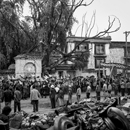
"Flames of My Homeland: The Cultural Revolution and Modern Tibet"
Photograph by Tsering Dorje. Used by permission of Tsering Woeser.
Click here to download high resolution version.
Photograph by Tsering Dorje. Used by permission of Tsering Woeser.
Click here to download high resolution version.
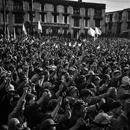
"Flames of My Homeland: The Cultural Revolution and Modern Tibet"
Photograph by Tsering Dorje. Used by permission of Tsering Woeser.
Click here to download high resolution version.
Photograph by Tsering Dorje. Used by permission of Tsering Woeser.
Click here to download high resolution version.
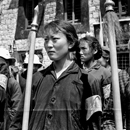
"Flames of My Homeland: The Cultural Revolution and Modern Tibet"
Photograph by Tsering Dorje. Used by permission of Tsering Woeser.
Click here to download high resolution version.
Photograph by Tsering Dorje. Used by permission of Tsering Woeser.
Click here to download high resolution version.
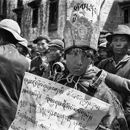
"Flames of My Homeland: The Cultural Revolution and Modern Tibet"
Photograph by Tsering Dorje. Used by permission of Tsering Woeser.
Click here to download high resolution version.
Photograph by Tsering Dorje. Used by permission of Tsering Woeser.
Click here to download high resolution version.
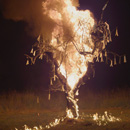
"Flames of My Homeland: The Cultural Revolution and Modern Tibet"
Video still from "The Birds Might Not Come." Courtesy Ian Boyden Studios, 2020.
Click here to download high resolution version.
Video still from "The Birds Might Not Come." Courtesy Ian Boyden Studios, 2020.
Click here to download high resolution version.
The exhibition “Flames of My Homeland” brings together for the first time the work of the extraordinary father and daughter Tsering Dorje and Woeser to highlight their contributions to Tibetan visual and literary culture, reveal new forms of Tibetan self-representation, and explore the complex interplay of artistic, political, and religious expression in contemporary China. The exhibition features photographs by Tsering Dorje and Woeser, and a set of original collaborative works by Woeser and Ian Boyden, featuring multimedia installations including Woeser’s poetry in her own voice, and the video "The Birds Might Not Come."
"The highest form of courage is simply saying or showing what's true," said co-curator William Frucht, Executive Editor for Political Science at Yale University Press. "Perhaps the most important thing Woeser inherited from her father is the courage to speak truth, and the ability to make it memorable."
"There is an archeological character to Woeser’s writing," said co-curator, visual artist, poet, and translator Ian Boyden. "Throughout her work she often focuses on loss, on the disappearance of things, especially elements of the Tibetan cultural landscape—the Dalai Lama, monasteries, language, even people themselves. In this exhibition, we highlight this archeological, fragmentary quality of her work, placing it in the context of her father’s photography documenting the destruction of Lhasa during the Cultural Revolution." Boyden is completing an English translation of Woeser’s collected poems. His work was previously included in the exhibition "The Alumni Show II" on display in Wesleyan University's Ezra and Cecile Zilkha Gallery from September through December 2013; as well as the exhibition "Tripod Complex" on display in the College of East Asian Studies Gallery at Mansfield Freeman Center from September through December 2015.
Please see below for more information about the exhibition and related online events.
A dedicated website for the exhibition launching this spring will feature additional images, text, poetry, and online events.
Support for the exhibition provided by the Center for the Arts, College of East Asian Studies, and the Allbritton Center for the Study of Public Life.
About the Exhibition
The works of Tsering Dorje and Tsering Woeser document the ravages of Tibetan society brought by the Cultural Revolution and their ongoing effects in Lhasa today. Tsering Dorje (c. 1937–1991), a native Tibetan, served as an officer in the People’s Liberation Army. His black and white photographs provide a rare visual record of the violence perpetrated in Tibet during a period of book burnings, political rallies, and public struggle sessions. His daughter, widely known by the single name Woeser, is a poet, essayist, and photographer, and is a leading Tibetan public intellectual in China whose work ranges from political criticism to reflections on Buddhist belief and practice, and the challenges of inhabiting both Chinese and Tibetan cultural worlds. Together, Tsering Dorje and Woeser are among the most important contributors to our understanding of Tibetan religion, history, and culture in the post-Mao era.
Related Online Events
FREE! Registration required for each of these Zoom webinars.
"Flames of My Homeland" Talk: Ian Boyden and William Frucht
Tuesday, February 23, 2021 at 4:30pm
Exhibition curators Ian Boyden ’95, a visual artist, poet, and translator; and William Frucht, Executive Editor for Political Science at Yale University Press; will discuss the lives of Tsering Dorje and Woeser, the intersections of art and politics, and the interpretation of photographs across geographic and cultural distance. Moderated by Andrew Quintman, Associate Professor of Religion and East Asian Studies at Wesleyan.
Artist Talk by Ian Boyden: "Dearest Elephant"—Collaborations between Ian Boyden and Tsering Woeser
Tuesday, March 16, 2021 at 4:30pm
Ian Boyden ’95—a visual artist, poet, and translator—will discuss his collaborations with the Tibetan poet and political dissident Tsering Woeser, focusing on works presented in the exhibition "Flames of My Homeland" on display in the Ezra and Cecile Zilkha Gallery. Despite these two artist-writers never having met each other in person, they have succeeded in creating a compelling body of work together including translations, films, and site-specific installations.
Burning for Buddhism: Art, Memory and Resistance in Tibet - Robert Barnett and Barbara Demick
Tuesday, March 30, 2021 at 4:30pm
A conversation on the role of art, memory, and resistance in Tibet with scholar of modern Tibetan history and politics Robert Barnett, Professorial Research Associate at SOAS University, London and former Director of Modern Tibetan Studies Program at Columbia University; and journalist Barbara Demick, former Beijing Bureau Chief for the Los Angeles Times, and author of "Eat the Buddha: Life and Death in a Tibetan Town" (2020).
Photography and Tibet: Widening the Frame with Clare Harris
Tuesday, April 20, 2021 at 4:30pm
A lecture on the history of the photographic representation of Tibet, exploring the wider context for Tsering Dorje’s photographs from the Cultural Revolutionary period, with Clare Harris, Professor of Visual Anthropology and Curator for Asian Collections at the Pitt Rivers Museum, University of Oxford, United Kingdom and author of "Photography and Tibet" (2016).